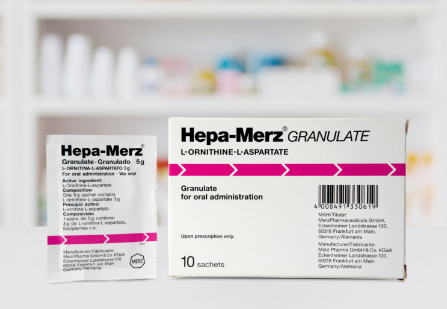
Liver cirrhosis is a chronic disease affecting the entire organ. If the underlying disease is not sufficiently treated or discovered too late, cirrhosis can change the liver structure over the years. In the long run, chronic damage inhibits the liver’s ability to regenerate and leads to the loss of liver cells. The liver tries to compensate for this loss and forms scarring tissue as a replacement. However, the new structures cannot fully retain the functions of a healthy liver.

As disease progresses, the liver hardens, becomes nodular and eventually shrinks. The blood supply to the liver is also severely impaired, so that the blood from the portal vein and hepatic artery can no longer flow properly through the liver and accumulates. As a result, portal vein hypertension develops.

Causes
- Chronic viral hepatitis (especially B and C)
- Fatty liver due to overeating
- Overconsumption of alcohol over a long period of time (alcoholic cirrhosis)
- Autoimmune chronic hepatitis
- Congenital diseases of iron, copper and fat metabolism
- Autoimmune chronic diseases of the bile ducts (e.g. primary biliary cirrhosis of the liver)
- Severe long-term cardiac insufficiency
Symptoms
Typical symptoms for liver disease:
- Lack of concentration and fatigue
- Jaundice
- Lacquer lips
- Liver tongue
- Redness of the palm (Palmar erythema)
- Benign disease of the connective tissue of the palm of the hand (Dupuytren’s contracture)
- Liver starlets on the skin
- Dropsy (Ascites)
- Increase in breast size (Gynecomastia of the man)

Diagnosis
Physical exam
Examining your abdomen can help identify an enlarged liver – a sign of inflammation.
Blood tests
Higher than normal liver enzymes can be a sign for liver inflammation.
Imaging procedures
An ultrasound or other imaging studies, such as CT or MRI scans, can help detect fat in your liver.
Liver biopsy
A liver biopsy is the best way to diagnose a fatty liver. A small piece of tissue is removed and examined to determine the status of your liver.
Therapy
To reduce the risk for fatty liver or in an early stage of the disease, following these general recommendations help you improve the health of your liver:
- lose weight
- control your blood sugar
- reduce intake of sugars and saturated fats
- limit or avoid alcoholic beverages
In addition to these recommendations, your doctor might consider putting you on medication that helps you improve your condition, e. g. a combination of amino acids which help detoxify the body.
A liver cirrhosis can be a life-threatening condition. In In severe cases, a liver transplant is the only option to save a patient’s life.

